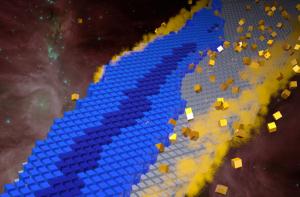
The team, led by Witek Nazarewicz, used a quantum approach known as density functional theory, applying it independently to six leading models of the nuclear interaction to determine that there are about 7,000 possible combinations of protons and neutrons allowed in bound nuclei with up to 120 protons (a hypothetical element called unbinilium).
The team's results are presented in the June 28, 2012 issue of the journal Nature [see below].
Most of these nuclei have not been observed experimentally.
"They are bound, meaning they do not spit out protons or neutrons," Nazarewicz explained. "But they are radioactive - they are short-lived, because there are other processes, such as beta decay, that can give rise to transmutations."
Of the total, about 3,000 have been seen in nature or produced in nuclear physics laboratories. The others are created in massive stars or in violent stellar explosions.
The computations allowed the team to identify the nuclear drip lines that mark the borders of nuclear existence. For each number of protons in a nucleus, there is a limit to how many neutrons are allowed. For example, a helium nucleus, which contains two protons, can hold no more than six neutrons. If another neutron is added to the nucleus, it will simply "drip" off. Likewise, there is a limit to the number of protons that can be added to a nucleus with a given number of neutrons. Placement of the drip lines for heavier elements is based on theoretical predictions extrapolated far from experimental data and is, therefore, uncertain.
The closer an isotope is to one of these drip lines the faster it decays into more stable forms. Particle accelerators have been unable to identify most of these exotic isotopes, especially those approaching the neutron drip line, because they are impossible to produce using current combinations of beams and targets. In fact, said Nazarewicz, all radioactive isotopes decay until they are transformed into one of 288 isotopes that form the so-called "valley of stability." These stable isotopes have half-lives longer than the expected lifetime of the solar system (about 4.6 billion years).
Earlier estimates of the nuclear landscape varied from as few as 5,000 to as many as 12,000 possible nuclei, Nazarewicz noted. He said his team's calculations were based on the microscopic forces that cause neutrons and protons to cluster into nuclei, adding that results from the six separate models were surprisingly consistent. By using several models, theorists were able for the first time to quantify uncertainties of predicted drip lines.
Because most of these nuclei are beyond our experimental reach, he explained, models must conform to known nuclei in a way that allows researchers to extrapolate results for exotic nuclei. Insight on the nature of most exotic nuclei must be extrapolated from models, he said.
"This is not a young field," Nazarewicz noted. "Over the years we've tried to improve the models of the nucleus to include more and more knowledge and insights. We are building a nuclear model based on the best theoretical input guided by the best experimental data."
The calculations themselves were massive, with each set of nuclei taking about two hours to calculate on the 244,256-processor Jaguar system. Nazarewicz noted that each of these runs needed to include about 250,000 possible nuclear configurations.
"Such calculation would not be possible two to three years ago," he said. "Jaguar has provided a unique opportunity for nuclear theory."
Nazarewicz noted that this work, supported by DOE's Office of Science - which also supports the Jaguar supercomputer - and by the Academy of Finland, has both existential value, helping us to get a better understanding of the evolution of the universe, and potential practical applications.
"We are not doing nuclear physics just to see whether you can get 7,000 species," he explained. "There are various nuclei that we can use to our advantage, eventually. Those we call 'designer nuclei.'"
Among these valuable nuclei are iron-45, a collection of 26 protons and 19 neutrons, which may help us understand superconductivity between protons; a pear-shaped radium-225, with 88 protons and 137 neutrons, which will help us understand why there is more matter than antimatter in the universe; and terbium-149, with 65 protons and 84 neutrons, which has shown an ability to attach to antibodies and irradiate cancer cells without affecting healthy cells.
"They have done experiments on mice and now humans in which they would look at the effectiveness of this treatment," he said. "This treatment is called an 'alpha knife.'
"Applications will certainly follow from the basic knowledge."
ORNL is managed by UT-Battelle for the Department of Energy's Office of Science. DOE's Office of Science is the single largest supporter of basic research in the physical sciences in the United States, and is working to address some of the most pressing challenges of our time.
Further Information:
Jochen Erler, Noah Birge, Markus Kortelainen, Witold Nazarewicz, Erik Olsen, Alexander M. Perhac, Mario Stoitsov:
The limits of the nuclear landscape.
In: Nature; published online27 June 2012, DOI 10.1038/nature11188
Source: DOE/Oak Ridge National Laboratory, USA
Last update: 27.06.2012
Perma link: https://www.internetchemistry.com/news/2012/jun12/nuclear-landscape-2012.php
More chemistry: index | chemicals | lab equipment | job vacancies | sitemap
Internetchemistry: home | about | contact | imprint | privacy
© 1996 - 2023 Internetchemistry
